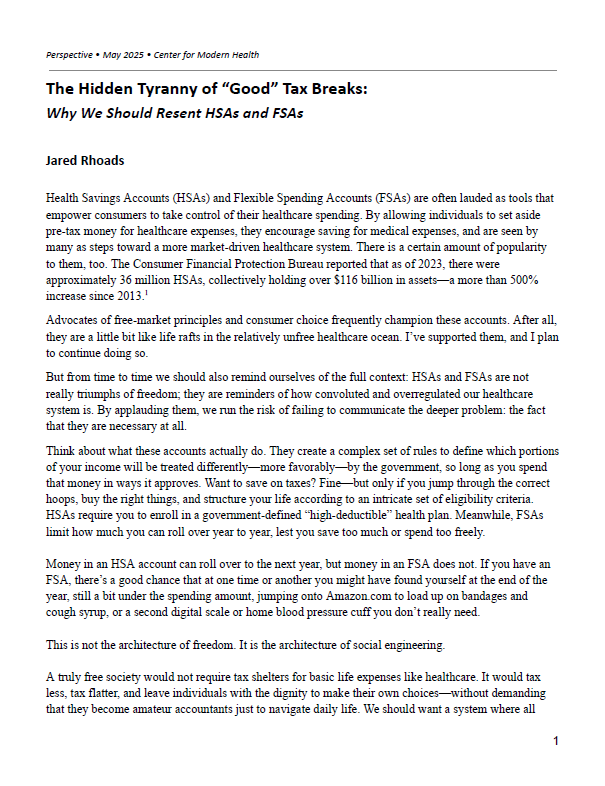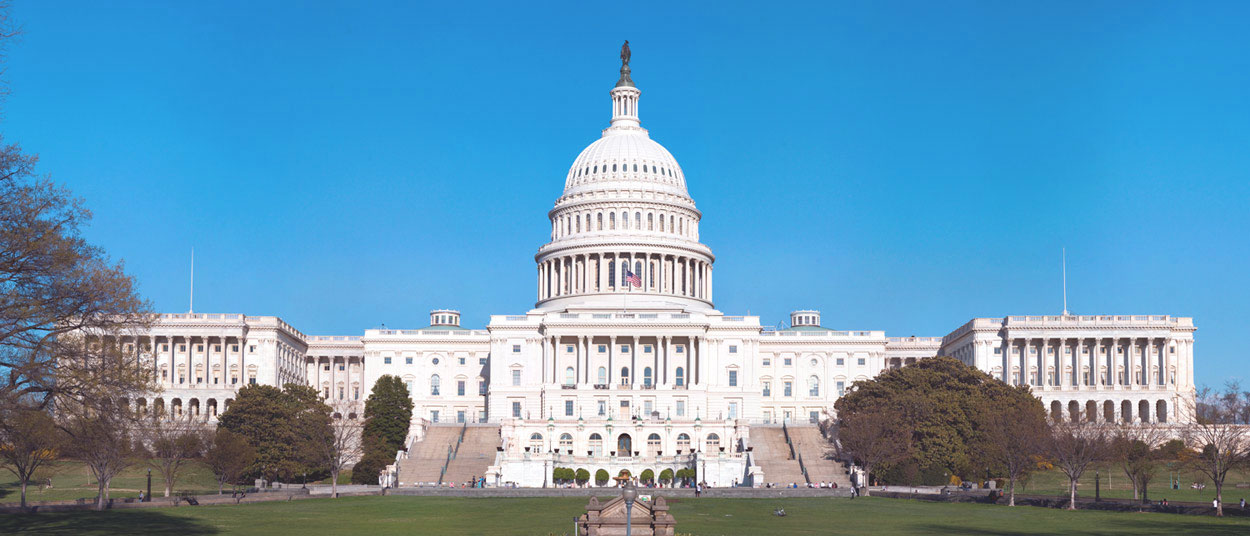The Hidden Tyranny of "Good" Tax Breaks: Why We Should Resent HSAs and FSAs
Health Savings Accounts (HSAs) and Flexible Spending Accounts (FSAs) empower consumers to take control of their healthcare spending, which is a good thing. But we should remember that they are not really triumphs of freedom; they are symbols of a broken system.
View/Download [PDF]
Rhoads, J. "The Hidden Tyranny of 'Good' Tax Breaks: Why We Should Resent HSAs and FSAs" Center for Modern Health. May 2025.
Health Savings Accounts (HSAs) and Flexible Spending Accounts (FSAs) are often lauded as tools that empower consumers to take control of their healthcare spending. By allowing individuals to set aside pre-tax money for healthcare expenses, they encourage saving for medical expenses, and are seen by many as steps toward a more market-driven healthcare system. There is a certain amount of popularity to them, too. The Consumer Financial Protection Bureau reported that as of 2023, there were approximately 36 million HSAs, collectively holding over $116 billion in assets—a more than 500% increase since 2013.1
Advocates of free-market principles and consumer choice frequently champion these accounts. After all, they are a little bit like life rafts in the relatively unfree healthcare ocean. I've supported them, and I plan to continue to do so.
But from time to time we should also remind ourselves of the full context: HSAs and FSAs are not really triumphs of freedom; they are reminders of how convoluted and overregulated our healthcare system is. If we applaud them too much, we run the risk of failing to communicate the deeper problem: the fact that they are necessary at all.
Think about what these accounts actually do. They create a complex set of rules to define which portions of your income will be treated differently—more favorably—by the government, so long as you spend that money in ways it approves. Want to save on taxes? Fine—but only if you jump through the correct hoops, buy the right things, and structure your life according to an intricate set of eligibility criteria. HSAs require you to enroll in a government-defined "high-deductible" health plan. Meanwhile, FSAs limit how much you can roll over year to year, lest you save too much or spend too freely.
Money in an HSA account can roll over to the next year, but money in an FSA does not. If you have an FSA, there's a good chance that at one point or another you have found yourself at the end of the year, still a bit under the spending amount, jumping onto Amazon.com to load up on FSA-eligible bandages and cough syrup, a second digital scale, or a home blood pressure cuff you don't really need. You can use FSA funds to buy a foot massager, but not to pay for a gym membership. You can use FSA funds to buy a treadmill, but only if you have a note from your doctor.
This is not the architecture of freedom. It is the architecture of social engineering.
A freer society would not need tax shelters for basic life expenses like healthcare. It would tax less, tax flatter, and leave individuals with the dignity to make their own choices—without demanding that they become amateur accountants just to navigate daily life. We should want a system where all income is treated equally, and where healthcare decisions are made by individuals and families, not by IRS rulebooks.
Comprehensive reform should aim for a simpler, more equitable tax system—one that doesn't rely on convoluted incentives to guide behavior. Lowering and flattening tax rates, while eliminating special deductions and exemptions for things including employer-based health insurance, would empower individuals to make financial decisions based on their unimpeded judgment rather than based on tax considerations.
HSAs and FSAs are better than nothing. But we should resent the fact that they are needed at all. They are not evidence that our government-directed approach to healthcare in the U.S. is working; they are evidence that it is failing. Let's be careful not to mistake small islands of partial freedom for the mainland we have yet to reach.
References:
1. "Issue Spotlight: Health Savings Accounts" Consumer Financial Protection Bureau. May 1, 2024.
